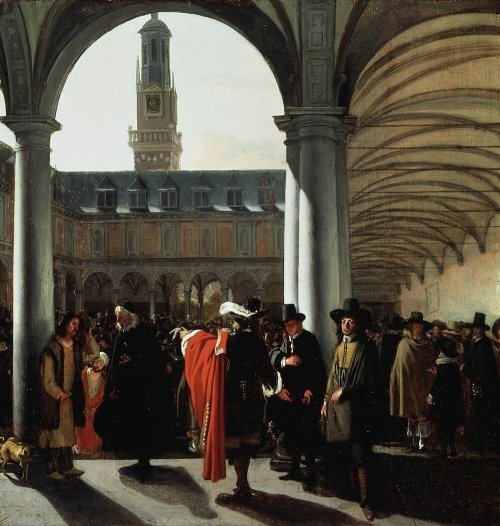
Humans crave certainty. We find comfort in consistency. Hollywood's business model has long exploited this tendency, minting money by supplying satisfying endings complete with closure. For empirical evidence, count the number of movies where the hero ends up dead or the good guys lose (Client Eastwood movies notwithstanding). To quote Philip J. Fry, "Clever things make people feel stupid, and unexpected things make them feel scared."
Trading provides no such comfort; the markets are characterized by constant uncertainty. If prices were certain, markets wouldn't need to exist at all. To be a successful trader in the long run you must be able to envision many different opposing outcomes, knowing full well that only one will come to pass. Moreover, the market likes to tease. Set a stop loss, and markets have a tendency to move inexorably toward it. Big, resting limit orders in the market have a tendency to get filled more often than not. Increasing your size after a big winning streak will probably lead to your worst day on record. If you have confidence in your strategy, you have no other choice but to power through: decreasing size in response to the singular loss will make it harder to recover.
We have often heard the following definition casually thrown about in popular culture: "insanity is doing the same thing and expecting different results." Most online sources attribute this to Albert Einstein. If that attribution is correct, perhaps that is why Einstein hated quantum physics so much. Einstein also said that he "refuse[s] to believe that God plays dice with the universe."
If you are a trader, you had best take these quotes with big, fat, granules of salt. By the definition above, a good trader is always insane. If you have a distinct trading strategy, you know that the same setups will often yield very different individual results. Too often we focus on the outcome of an individual decision rather than the underlying process that generated the decision. As any system trader knows, its not about each individual trade but how your strategy performs across a series of trades. High frequency trading relies on this fact (the law of large numbers): if they are right 51% of the time and take millions of trades, then the strategy will mint money. It doesn't matter that each trade has a high probability of ending with a loss. Of course, you need capital to absorb the potential for a bad run.
Traders must live in a world of logical inconsistency. You must be able to flip your assumptions on a dime, but also know how to identify the times you are just experiencing a bad run that is consistent with probability. Adjust your settings too quickly and you risk getting perpetually turned around, always chasing what worked in the near past and never being right. Who hasn't experienced a few days of bad results then made an adjustment, the result of which made you lose money when trading returned to normal the next day? Traders must constantly balance the signal from the noise.
Society, however, prizes logical consistency. The best example is the reaction to a politician changing his/her mind. They are often labeled as an inconsistent flip-flopper. Some call them opportunistic. But what is wrong with changing your mind after being presented with new information? This is how humanity has survived up to this point, by adjusting its collective beliefs in response to new information. Suppose you begin crossing the street, thinking the coast is clear. Then, out of the corner of your eye you catch a glimpse of a city bus barreling towards you. Are you insane or inconsistent for running back to the curb? No, you are adjusting your beliefs to survive in an optimal fashion. Traders must adjust their beliefs to survive in the financial jungle, and those that fail to adapt risk getting eaten alive.
One of the biggest mistakes people make trading is sticking to a belief just because they told a bunch of people about it. They feel compelled to stick with the belief even when the market presents them with abundant evidence to the contrary. This is especially true when the belief is held by a large number of other people. The best trader's don't give a shit about what other people think of them; the best traders know that money talks, and bullshit walks (presumably out the door to the unemployment office, or off the roof of a tall building). Don't be one of those people, hold your own set of beliefs and adjust them only when presented with sufficient evidence from the market.
Check out my last post: Current Crypto Crash is a Conundrum: Low Volume AND High Volatilty

" If prices were certain, markets wouldn't need to exist at all."
I agree.. thanks for your report
great thought provoking piece. My problem has always been, I give advice that is more solid than the game I actually end up playing.
Objectivity is key in this game and that is where I believe most of us become unstuck. My plan in a cold state never seems to stand when in the throws of making important buy / sell decisions.
Human volatility is mirrored by that of the market.
Really great article though.
thanks for your feedback!
i smiled a bit when i read this:
In the beginning of my career I could really empathize with this thought... I felt the same way... Thats ultimately why I adopted algorithmic trading, because I could dispense "advice" via code to my programmable desk of robot traders ;-) Over a decade later, i see the greatest advice an old trader ever gave me was to learn a programming language.
Solid advice I should take and apply, thanks for it.
no prob! i would recommend starting with either python or R as good languages to learn. They're both ubiquitous in the industry, and are pretty much mandatory for a front office trading role these days.
Thank you, I am still a small fish, I promise will keep following you, I am sure can be a lot of information from you,
I follow you because I want to know something new from you
your post a nice, a lot of science and helpful information in your blog, I will try continue to follow each of your post, thank you for upvote.
thank you very much for helping me, it seems you are very experienced in steemit, I want you to share my experience for me so that I can also succeed like you.
Beatiful picture @marketstack
I like picture @marketstack
Thanks for your support me @marketstack
dunno if you noticed, but there were some words as well!
Hi,@markestack excellent publication, I think that trade at the commercial and monetary level adjusts to time to changes in the environment is dynamic and the decisions we must make must be adjusted for example, we must make changes to budgets maintaining the quality of a product considering the competition and In the case of shares of the market, including the crypto currency, the spread and expansion in terms of the number of people trading for the same purpose have generated changes from one investment to another, despite the market fluctuations that generate losses or profits, but despite remaining in the market is what generates confidence to investors and evaluations should be made prior to the investment project used .ROI or "Return Over Investment" as it is known by its acronym in English corresponds to the benefit obtained for each monetary unit invested in any activity economic during a period of time. It is often used to analyze the viability of a project and measure its success. In times of crisis, it becomes a fundamental part so that each inverted dolllar cent returns accompanied by surpluses.
Thank's but upvote me mr.@marketstack
Sir follow me ..and vote my post please
Nice and so informative post ....it will help people definitely.....
Informative post dear